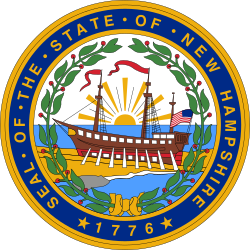| |||||||||||||||||||||||||||||||||||||||||
| |||||||||||||||||||||||||||||||||||||||||
Reagan: 30-40% 40-50% 50-60% 60-70%
| |||||||||||||||||||||||||||||||||||||||||
| Elections in New Hampshire |
|---|
 |
The 1980 New Hampshire Republican presidential primary was held on February 26, 1980, in New Hampshire as one of the Republican Party's statewide nomination contests ahead of the 1980 United States presidential election.
Despite having recently lost the Iowa caucuses in a shocking upset, Ronald Reagan claimed a landslide victory, securing a majority of the vote and a 27 percentage point victory over his next closest opponent, George H. W. Bush. Behind them, Howard Baker of Tennessee finished 3rd, and John Anderson of Illinois finished 4th. [1] [2]





